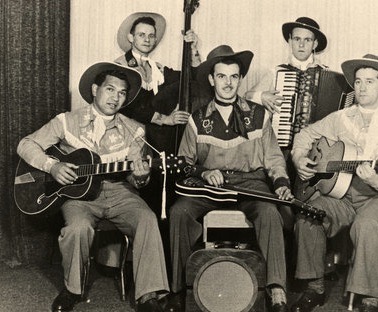|
This
is a song often sung when Kiwis are having a singalong
session. The intertwining of the voices helps bind the
singers together emotionally.

Johnny Cooper Born in 1929, Cooper grew up on an
isolated farm near Wairoa. His hero in the movies was Gene
Autrey, the singing cowboy. He was gifted a ukulele by his
uncle, and would play in woolsheds to entertain the shearing
gangs.
He won a scholarship to attend Hawkes Bay’s illustrious Te Aute college. After attending for 2 years, he was desperate to leave, but his elders were insistent that he stay for a third year. So he boarded the train to return to school from Wairoa, and instead stayed on board and ran away to Wellington. This resulted in being disowned by his parents. He stayed in a Newtown boarding house and got a job digging graves at Karori cemetery. He practised singing as he dug graves during the day and on Saturday nights he sang at cinemas and suburban halls, dressed in a cowboy suit. He made friends with fellow
grave-digger and bass-player Willy Lloyd-Jones, and in 1953 they
formed The Ridge Riders with guitarist Ron James and Don
Aldridge on steel. The group wore cowboy-style outfits and
became well-known at talent quests and in live shows on radio,
with live appearances in Wanganui and at Linton and Waiouru.
On Sundays they recorded in Alan
Dunnage’s studio inside an old shop in Island Bay, and a duet by
Cooper and Margaret Francis became the No.1 recording of 1954
with One By One (we broke each vow we made)
and Look What You’ve Done becoming a
double-sided 78rpm hit.
 He had written most of the song
in a day: “I heard someone say ‘Look what you’ve done’ and
thought that was a crazy thing to say, that it would be good
to sing something like that.”
“Shearing shed or anywhere,
every party you went to in that period that was all you heard
them sing.” The song became a well-known Kiwi party song
and was famously sung by Jake and Beth Heke in the 1994 film Once
Were Warriors.’
Sing these similar songs also |